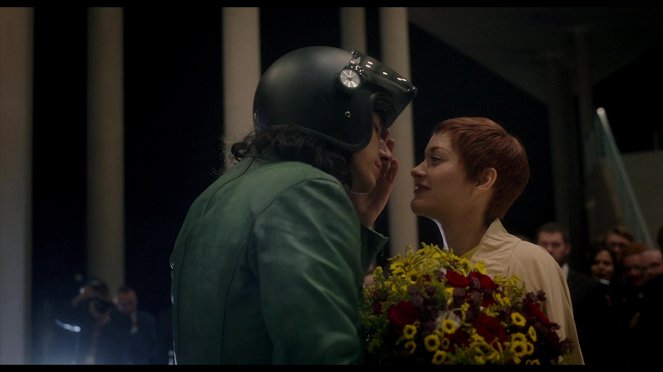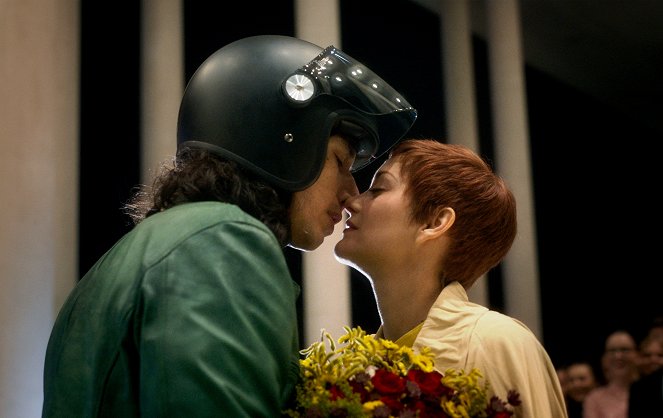Directed by:
Leos CaraxCinematography:
Caroline ChampetierCast:
Adam Driver, Marion Cotillard, Simon Helberg, Rebecca Dyson-Smith, Rila Fukushima, Natalie Jackson Mendoza, Ron Mael, Russell Mael, Kiko Mizuhara (more)VOD (1)
Plots(1)
Annette is a mind-blowing musical odyssey starring Adam Driver as Henry. A provocative stand-up comedian with a fierce sense of humour, who falls in love with Ann (Marion Cotillard), a world-famous soprano. In the spotlight, they are the perfect couple, healthy, happy, and glamourous. However, their lives take an unexpected turn when their daughter, Annette, is born. A mysterious girl with an exceptional gift that will turn their lives upside down. Winner of Best Director at the 2021 Cannes Film Festival, visionary director Leos Carax astounds with this glorious rock opera. Featuring music and original story by Ron and Russel Mael, of Sparks, Annette is an exhilarating journey of passion, love, and fame. (Madman Entertainment)
(more)Videos (6)
Reviews (7)
This is a film that tries to kill a man to save him. Nobody can rip a man's eyes out of his head and turn them inside out like Carax. You stare into the abyss and it stares into you. For me, it is a surprisingly intimate film about pain, self-deception and fatherhood, about the illusions in which we lose ourselves, and also about the fact that film as the ultimate illusion can sometimes tear off all masks. Rationality is overrated, imagination will save the world. Or at least give it a decent funeral.
()
The musical is itself a genre that divides audiences, and I think this film will divide its fans into two camps: either you'll be excited by this rock opera or you'll be perplexed by it. Personally, I am in the latter category. Annette is a poetic story about love, professional jealousy, the flip side of popularity, and also about fatherhood and forgiveness. Already in the first minute, I got the impression that this was going to be a very weird film. The music by the Mael brothers, aka The Sparks, was catchy and I don't have a single complaint in that regard, but at times I found the lyrics a bit repetitive, and "We love each other so much" was still ringing in my head a few days after the film. I certainly appreciate that the story itself is quite simple, but it is presented in a very unpredictable way. Most of the time I had no idea where the film was heading, which meant I was in for a lot of surprises. For example, a newborn puppet child who clearly inherited Adam Driver's ears. I can understand this decision from a creative point of view, because metaphorically Annette does become a puppet of her parents who use her for their own purposes, but I found it very distracting, even comical. But maybe that's what made the final scene with "Pinocchio's transformation" all the more impressive and emotional. Marion Cotillard was a bit bland alongside her fellow actors this time. Adam Driver gives another riveting performance, and his friend Simon Helberg, the conductor, charmed me with his performance; I would have liked more space for him, because dramatic roles suit him, and I hope to see him more often in them. So what is the source of the perplexed feeling about this film? The singing of Marillon and Adam did not please my ears and their daughter Annette reminded me more of a Chucky doll. Finally, the fact that this film is such a dreamy mix of genres full of surprises that feels a bit cluttered, but at the same time paradoxically very ordinary, which can be just a bit confusing in the end.
()
This was my first encounter with this director, and I have to say, Annette is a wild ride. It's not filled with grotesque or over-the-top nastiness like some other weird films, but it’s still totally insane. Adam Driver and Simon Helberg give performances that are completely indulgent, while Marion Cotillard just coasts along, remaining as captivating as ever. The plot is simple and straightforward, but the theatrical delivery of the lines doesn’t make it easy for the audience. The visuals are striking, and the musical interludes, though repetitive, add an interesting layer. The recurring lyrical themes act like refrains, which was the least of my issues compared to the overall very peculiar execution.
()
The first half is absolutely stunning and captivating; it loses a bit of momentum in the middle, but the final act is brilliant once again. We haven't seen a musical this unique in a long time, featuring a meticulously crafted visual style and an electrifying performance by Adam Driver. For many, it might be too unconventional and exhausting, but it's not as intensely arty as some might fear. It was a bit of a gamble for me, but I'm thrilled that Annette was my return to the cinema after nearly a 10-month hiatus.
()
Neo-Baroque lost its neo and only baroque remained, whose weight of gilded encumbrance may have been another bead in the rosary of genre-ironic creations of cinéma du look, but the repetition of the prayer mantra reveals itself here as a doubly double-edged sword, which Carax cut himself with this time: by repeating the form, its true power was diluted, the power of negation through a convention-incompatible form, to such an extent that the negation of negation (= form) evoked simple mathematics - multiplying two minuses gives us a plus, which is nothing but the valorization of the content itself. And in the content, I saw nothing but convention, to which only a different narrative vector and occasionally a comedic tone could not suffice to break free from it. Symptomatically, here, the undermining and playing with genre forms (musical, melodrama, fairy tale, etc.) is nothing more than something we have already seen in other more commercial works because such "postmodernity" has long been privatized by Hollywood. Hollywood has finally caught up with and absorbed Carax like a depth that is truly dangerous to look into because, from this perspective, cinéma du look can turn into cinéma du don't look. Neo-baroque always started in apparent kitschy sweetness only to turn bitter, but this transition was (in the best works) caused precisely by the inversion of conventions of given forms, while when we want to repeat this Neo-baroque dramatic arc only on the level of content, we always end up with nothing but convention sneaking in through the back door. Perhaps the transformation of the puppet into a living being was supposed to be an interpretive indication of the author's mise en abyme, with which Carax wanted to convince the viewer at the last moment that his film is not just a bloodless marionette swallowing the budget, but a work containing life, yet even in this final attempt (which is nothing other than a replication of Hollywood desires), he failed.
()



Ads